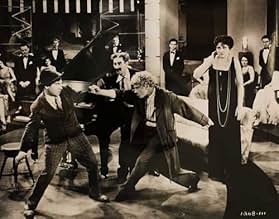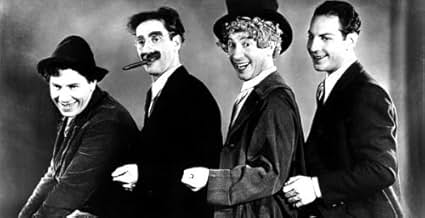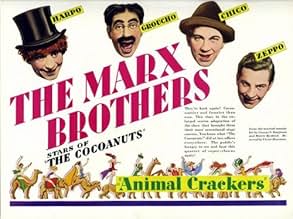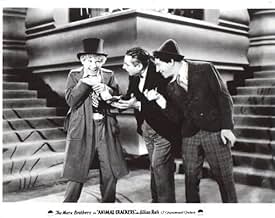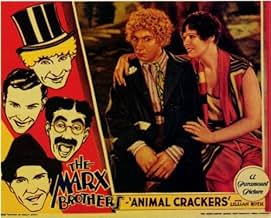VALUTAZIONE IMDb
7,4/10
15.722
LA TUA VALUTAZIONE
Caos e follia nascono quando un prezioso dipinto scompare durante una festa in onore dell'esploratore africano Capitano Spaulding.Caos e follia nascono quando un prezioso dipinto scompare durante una festa in onore dell'esploratore africano Capitano Spaulding.Caos e follia nascono quando un prezioso dipinto scompare durante una festa in onore dell'esploratore africano Capitano Spaulding.
- Regia
- Sceneggiatura
- Star
- Premi
- 2 candidature totali
Groucho Marx
- Captain Geoffrey T. Spaulding
- (as The Marx Brothers)
Harpo Marx
- The Professor
- (as The Marx Brothers)
Chico Marx
- Signor Emanuel Ravelli
- (as The Marx Brothers)
Zeppo Marx
- Horatio Jamison
- (as The Marx Brothers)
Robert Allen
- Party Guest
- (non citato nei titoli originali)
Donald MacBride
- Party Guest
- (non citato nei titoli originali)
Ann Roth
- Party Guest
- (non citato nei titoli originali)
Recensioni in evidenza
For many years, ANIMAL CRACKERS was a "lost" film. Paramount owned the audio, and Universal owned the Visual elements (It may of been vice-versa) During the re-birth of Marx Brother popularity, ANIMAL CRACKERS mad it's way back into theatres in the Fall of 1974.
It was a thrill to see the movie in a theatre (the best place to see a classic comedy). The plot concerns a wild, out of control explorer's (Groucho Marx) visit to a Long Island estate. He comes across stuffy snobs and a questionable musician for hire (Chico Marx and his lunatic partner, Harpo.) Groucho's dialog is superb. His verbal assaults on stuffed shirts are priceless "It's not safe to ask this man a simple question" Groucho says to the audience when he talks to a pompous "art critic".
Chico and Harpo provide the more manic visual antics, especially when they steal the birth mark of above mentioned art critic. Even straight man Zeppo gets to be funny and silly.
The only real problem with the film is well voiced in critic's Richard Anobile's review "This is a RECORDING of a stage play. The camera barely moves. it just sits there and records the Marx Brothers" Still in all, see ANIMAL CRACKERS to enjoy the joy of Marx mayhem
It was a thrill to see the movie in a theatre (the best place to see a classic comedy). The plot concerns a wild, out of control explorer's (Groucho Marx) visit to a Long Island estate. He comes across stuffy snobs and a questionable musician for hire (Chico Marx and his lunatic partner, Harpo.) Groucho's dialog is superb. His verbal assaults on stuffed shirts are priceless "It's not safe to ask this man a simple question" Groucho says to the audience when he talks to a pompous "art critic".
Chico and Harpo provide the more manic visual antics, especially when they steal the birth mark of above mentioned art critic. Even straight man Zeppo gets to be funny and silly.
The only real problem with the film is well voiced in critic's Richard Anobile's review "This is a RECORDING of a stage play. The camera barely moves. it just sits there and records the Marx Brothers" Still in all, see ANIMAL CRACKERS to enjoy the joy of Marx mayhem
The Marx Brothers' second movie is one of their funniest, despite suffering from some of the same limitations of the early sound era as their first film, The Cocoanuts. It's a great movie with the Marx Bros. at their zany best. Groucho is Captain Spaulding, Chico is Signor Emanuel Ravelli, Harpo is The Professor, and Zeppo is....well, who cares who Zeppo is? He actually gets a funny scene in this movie, taking dictation from Groucho. That's uncommon as he was usually just the straight man. The movie's plot, such as it is, revolves around a painting stolen at a party thrown by a rich dowager (Margaret Dumont) for famed explorer Capt. Spaulding. The guys are all funny and the movie's full of memorable sketches, songs, and one-liners. Lllian Roth is enjoyable as half of the obligatory romantic subplot. That's a rarity for the Marx Bros. movies, where typically the two young people shoehorned in for a romantic subplot are the worst part of the picture. Roth's charming presence makes it more bearable this time. Special mention to the amazing Margaret Dumont, who was a vital part of the success of the best Marx movies. Here she even gets to do some physical comedy in a hilarious scene with Harpo.
I love the Marx Bros' Paramount films for their energy and eccentricities. From this movie until Duck Soup, the boys were at their best, in my opinion. Yes, they made some good ones after that but they were more polished and structured than the Paramount movies. Animal Crackers is a classic with many great jokes and routines, including "Hello I Must Be Going," breaking the fourth wall, the bridge scene, "elephant in my pajamas" and pretty much every line of dialogue Groucho has.
I love the Marx Bros' Paramount films for their energy and eccentricities. From this movie until Duck Soup, the boys were at their best, in my opinion. Yes, they made some good ones after that but they were more polished and structured than the Paramount movies. Animal Crackers is a classic with many great jokes and routines, including "Hello I Must Be Going," breaking the fourth wall, the bridge scene, "elephant in my pajamas" and pretty much every line of dialogue Groucho has.
Judging by the script, you'd never believe that "Animal Crackers" is over seventy years old. Think of all the "postmodern" things that happen in this movie: Groucho directly addresses the audience to apologize for a bad joke; Harpo shoots a gun at a statue, only to see the statue come to life and return fire; and Margaret Dumont freezes in time while Groucho has a "strange interlude" and rambles to the audience about the perils of marriage and living with your folks! Of course, the absolutely ancient and decaying print will remind you that "Animal Crackers" is older than the hills, but otherwise, it's much fresher and weirder than the stuff that passes for comedy today.
Like "The Cocoanuts," this movie is based on a play, and as such it is considerably longer and stagier than most of the later Marx movies. The pace does drag a bit towards the end, especially since the plot disappears (along with Zeppo) for long segments at a time. But many of the individual segments are classic, including the often (and rightly) praised bridge game and Harpo's gag with the cutlery-filled sleeves. Even the music segments hold up well, particularly Chico's piano routine that gets savaged by Groucho.
Interestingly, there is a prominent romantic subplot to this film, which puts paid to the fallacy that Marx Brothers movies didn't have romances until MGM got its hands on them. However, the romance isn't nearly as intrusive or annoying here as in their later vehicles, so there's still plenty of reason to be annoyed with good old MGM...
Like "The Cocoanuts," this movie is based on a play, and as such it is considerably longer and stagier than most of the later Marx movies. The pace does drag a bit towards the end, especially since the plot disappears (along with Zeppo) for long segments at a time. But many of the individual segments are classic, including the often (and rightly) praised bridge game and Harpo's gag with the cutlery-filled sleeves. Even the music segments hold up well, particularly Chico's piano routine that gets savaged by Groucho.
Interestingly, there is a prominent romantic subplot to this film, which puts paid to the fallacy that Marx Brothers movies didn't have romances until MGM got its hands on them. However, the romance isn't nearly as intrusive or annoying here as in their later vehicles, so there's still plenty of reason to be annoyed with good old MGM...
Animal Crackers was the second of two Broadway shows that starred the Marx Brothers and was done at the Paramount Astoria Studios. After they went to Hollywood, with the exception of Room Service, all their material was original for the screen.
The Brothers were doing Animal Crackers on Broadway in 1928-1929 and it had a respectable run of 191 performances. In fact while they were doing Animal Crackers on stage, for a part of 1929 they were shooting The Cocoanuts at the Astoria Studios. Unlike The Cocoanuts, nearly the entire Broadway cast was used in the film, with the exception of the juveniles, Lillian Roth and Hal Thompson. Also unlike The Cocoanuts nearly the entire Bert Kalmar-Harry Ruby score was discarded with the notable exception of Groucho's immortal theme Hooray for Captain Spalding. Kalmar and Ruby did write the ballad that Roth and Thompson sing, Why Am I So Romantic for the screen version.
Margaret Dumont as Mrs. Rittenhouse of the Long Island horsey set is throwing a party and the guest of honor is Groucho with his secretary Zeppo as Captain Spalding. Crashing the party is Chico and Harpo.
But not only is Captain Spalding on display, Dumont is giving an unveiling of a famous painting for which two people have brought copies for different purposes. Of course the original does get stolen and there's no use me going on any further because the plot just dissolves with the various monkeyshines engaged in by the Marx Brothers.
My favorite bits are Groucho when he does a devastating lampoon on Eugene O'Neill's Strange Interlude. It turned out to be too good a satire because when the play made it to the screen two years later, no one took it seriously.
Secondly is Chico and Harpo, mercilessly threatening to expose hoity toity art critic Louis Sorin who they knew back in the day as Abie the Fishman. Actually that's kind of sad in a way because Sorin may be a snob now, but he did in fact educate himself out of peddling fish and rose in an honorable to a legitimate living. But you don't think about that while Chico and Harpo are doing their thing.
Although like The Cocoanuts it's a photographed stage play, Animal Crackers works a whole lot better. The play itself was primarily on one set on the stage and it transitions better to the screen than The Cocoanuts did.
The brothers are at their most anarchistic and zany here, try not to miss it.
The Brothers were doing Animal Crackers on Broadway in 1928-1929 and it had a respectable run of 191 performances. In fact while they were doing Animal Crackers on stage, for a part of 1929 they were shooting The Cocoanuts at the Astoria Studios. Unlike The Cocoanuts, nearly the entire Broadway cast was used in the film, with the exception of the juveniles, Lillian Roth and Hal Thompson. Also unlike The Cocoanuts nearly the entire Bert Kalmar-Harry Ruby score was discarded with the notable exception of Groucho's immortal theme Hooray for Captain Spalding. Kalmar and Ruby did write the ballad that Roth and Thompson sing, Why Am I So Romantic for the screen version.
Margaret Dumont as Mrs. Rittenhouse of the Long Island horsey set is throwing a party and the guest of honor is Groucho with his secretary Zeppo as Captain Spalding. Crashing the party is Chico and Harpo.
But not only is Captain Spalding on display, Dumont is giving an unveiling of a famous painting for which two people have brought copies for different purposes. Of course the original does get stolen and there's no use me going on any further because the plot just dissolves with the various monkeyshines engaged in by the Marx Brothers.
My favorite bits are Groucho when he does a devastating lampoon on Eugene O'Neill's Strange Interlude. It turned out to be too good a satire because when the play made it to the screen two years later, no one took it seriously.
Secondly is Chico and Harpo, mercilessly threatening to expose hoity toity art critic Louis Sorin who they knew back in the day as Abie the Fishman. Actually that's kind of sad in a way because Sorin may be a snob now, but he did in fact educate himself out of peddling fish and rose in an honorable to a legitimate living. But you don't think about that while Chico and Harpo are doing their thing.
Although like The Cocoanuts it's a photographed stage play, Animal Crackers works a whole lot better. The play itself was primarily on one set on the stage and it transitions better to the screen than The Cocoanuts did.
The brothers are at their most anarchistic and zany here, try not to miss it.
The Marxes second film is an even more uncinematic production than their first ("The Cocoanuts"). The camera barely moves throughout the picture, and matters are not helped at all by the fact that the print is in fairly poor condition, with entire frames missing from several scenes. And, as usual, the film contains far too much music. Nevertheless, the brothers (and especially Harpo and Chico, who in my opinion have all the funniest scenes) are amazingly lively for a 1930 film, and they make it worth seeing after all. (**1/2)
Lo sapevi?
- QuizIn the interchange between Spaulding and Ravelli near the end of the film, Spaulding refers to "Chic Sale". Chic Sale was a vaudeville performer well-known to audiences in the 1930s. His name, however, had a parallel meaning. It had become a euphemism for an outhouse. Groucho Marx may have thought the reference as a way around the Hays Office code. The comedian Soupy Hines changed his name to Soupy Sales in honor of the original Sale. His birth name was Milton Supman.
- BlooperWhen Professor replaces the handgun for a rifle after he shoots himself in the foot, Hives can be seen in the background walking behind the column, clearly awaiting his turn to enter the scene.
- Citazioni
Capt. Spaulding: [Speaking directly at the camera] Well, all the jokes can't be good. You've got to expect that once in awhile.
- Versioni alternativeCensored for a 1936 reissue to meet Production Code requirements; this censored version was the only one available for television showings and subsequent VHS/DVD releases. A surviving complete and uncensored print was found in England, and is the source being used for the 2016 blu-ray release.
- ConnessioniFeatured in 46th Annual Academy Awards (1974)
- Colonne sonoreYou Must Do Your Best Tonight
(1930) (uncredited)
Music by Harry Ruby
Lyrics by Bert Kalmar
Sung by Robert Greig and The Music Masters
I più visti
Accedi per valutare e creare un elenco di titoli salvati per ottenere consigli personalizzati
- How long is Animal Crackers?Powered by Alexa
Dettagli
Botteghino
- Lordo Stati Uniti e Canada
- 910.015 USD
- Tempo di esecuzione1 ora 37 minuti
- Colore
Contribuisci a questa pagina
Suggerisci una modifica o aggiungi i contenuti mancanti

Divario superiore
By what name was Animal Crackers (1930) officially released in India in English?
Rispondi

